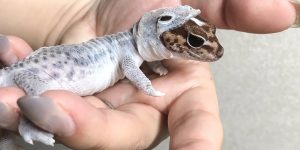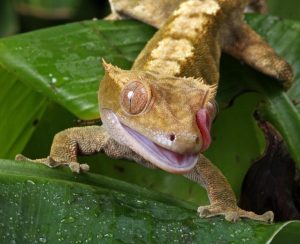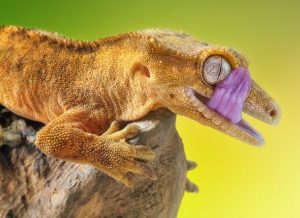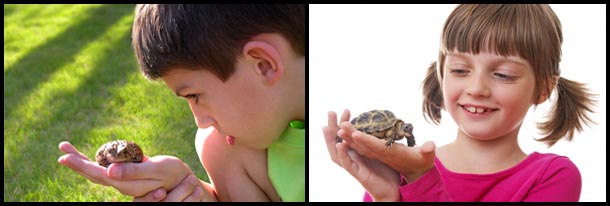Geckos usually lick their lips because they are shedding their skin and need to loosen the skin on their face. However, it can also be a sign of a health problem such as mouth rot or metabolic bone disease, so you should check your gecko carefully for any other symptoms.
Shedding
Your gecko licking its mouth could be simply because it is shedding. Shedding takes between 1 and 2 days, and during this process, your gecko may lick its lips to loosen the skin around its mouth.
Geckos shed their skin once every 4 – 8 weeks, depending on their age and type. Younger geckos will shed much more often than adults since they grow much faster.

You can tell if your gecko is licking its lips from shedding by checking a number of factors. For a few days before the shedding, their skin will become grey or pale, which is usually very noticeable. Many owners also see their gecko becoming less interested in their food, and seeming less happy in general. They may not be as enthusiastic as usual to play or sit in your hands.
Shedding is a normal process, but you can help them along by increasing the humidity of their cage. Spraying down the tank with water two or three times a day will help their skin to soften, making the shedding process quicker.
If they aren’t showing signs of shedding, or continue to lick their lips even after shedding, it could be a sign of an illness of the mouth. There are many examples, but the two most common are mouth rot and metabolic bone disease.
Mouth rot
Geckos are at risk of many health problems relating to their mouths, which could cause your gecko to lick its mouth in discomfort. Mouth rot, or Ulcerative Stomatitis, is the most common dental condition in geckos. It is an infection of the mouth and gums caused by having small cuts or food stuck in their teeth.

One quick way to check for mouth rot is gently to open your gecko’s mouth to check for any dark patches between their teeth. You can also look closely for any small cuts in their gums. If you are finding it difficult to check for these features, there are a few symptoms you can also look for.
Your gecko may be drinking less water, and show disinterest in their food. You may also notice swelling around their gums and mouth or even their whole head. When you check their mouth for the common markers, they may have yellow plaques around their teeth, or areas of yellow discharge. These symptoms don’t appear in all cases of mouth rot though.
If any of these symptoms are present in your gecko, you should contact a veterinarian. Don’t make any attempts to medicate the mouth rot unless guided by a professional.

Metabolic bone disease (MBD)
Metabolic bone disease can occur if your gecko has too little calcium in their diet. It causes softening of the jaw, which can cause geckos to lick its lips.
Check if your gecko has unusually bowed or swollen legs, or small bumps along its spine and tail. It may twitch its legs when at rest. They may also seem lethargic, and have a weak grip and difficulty climbing.
There are many symptoms of metabolic bone disease, which can vary from gecko to gecko. If you see any worrying symptoms or new unusual behaviours in your gecko, always contact a veterinarian to be safe.



